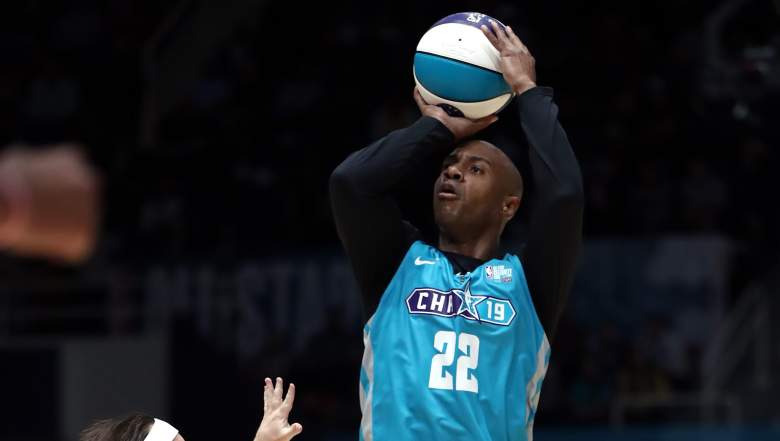
Getty Jay Williams, in the 2019 All-Star Celebrity Game
Former Duke star Jay Williams knows a good bit about the NCAA Tournament. As a sophomore in 2001, Williams averaged 21.6 points and 6.6 assists and helped lead the Blue Devils to a national title. He was the leading scorer in the tournament, at 154 points, including back-to-back 30-point games in wins over Missouri and UCLA.
But Williams, who played one season in the NBA before a motorcycle accident cut short his career, on Thursday morning pleaded with the NCAA to drop its plans to continue to play the March Madness tournament without fans despite fears over the spread of coronavirus.
Speaking on ESPN’s Get Up morning show, Williams said that, in postponing the remainder of its season, the NBA had established that it was too dangerous to put potentially infected players on a court with each other. The NCAA should take notice. “We have to have a big-picture view here and not think about short-term gains,” Williams said.
Williams looked across at fellow former NBA player Matt Barnes and noted that the nature of basketball—with the amount of direct physical contact—makes it impossible to play without the potential spread of the virus.
For unpaid college players, there is much risk but little reward—even as the NCAA is still grappling with the concept of paying college athletes for use of their likenesses.
“If I am guarding Matt Barnes, he is breathing all over me,” Williams said. “If the NBA has set the precedent about what this is going to be, the NCAA needs to do the same. … At least in the NBA, you’re incentivized, you can make millions of dollars. Now what you’re saying, as we’re still working on this name, image and likeness scenario, state-by-state, we’re still trying to figure out whether that’s going to happen or not, now you’re going to ask players to jeopardize their health.”
NCAA Should Follow NBA, Williams Says
The NCAA has said it would play tournament games with only immediate family members and administration present. That, Williams said, is not good enough.
“I don’t know where these immediate family members and administration or other players have been,” he said. “But now I have to jeopardize my health and play for something and I’m not getting paid for it anyway. It’s crazy.”
Certainly, the decision did not come lightly in the NBA. In the midst of a tense week trying to sort out a course of action on the coronavirus as it begins to spread here in the U.S., NBA commissioner Adam Silver ultimately took on the responsibility for shutting down the season.
That decision came when it was revealed that a player with the Utah Jazz—reportedly center Rudy Gobert—had tested positive for coronavirus, forcing the postponement of the scheduled Jazz-Thunder game.
Earlier in the week, there had already been a conference call with the league and team doctors and, on Wednesday, there was a call with the Board of Governors.
Nothing had been decided coming out of that call, but a decision on how to proceed was expected on Thursday. The possibility of playing games without fans—the Warriors had already agreed to do so for their game against the Nets on Thursday—appeared almost certain to be the main course of action under consideration by the NBA.
Player Coronavirus Diagnosis Changed NBA Outlook
But the diagnosis of a player quickly changed the league’s calculus. While the focus had been on keeping the virus from circulating among large crowds, that focus shifted toward keeping players and their families safe.
That’s a lesson the NCAA should take, Williams said. Players who have worked to be in the NCAA Tournament all year and longer still want to proceed with the event, as do TV stations that make a fortune off the advertising revenues. That’s not what’s most important here, though.
“They are 18- and19-year old kids, 20-year old kids,” Williams said, “and it is our job as adults who have had those experiences to sit them down and reason with them and help them understand the practicality of the matter. This is a rapid virus that is growing very quickly. We need to think about this holistically and not just think about short-term gain.”